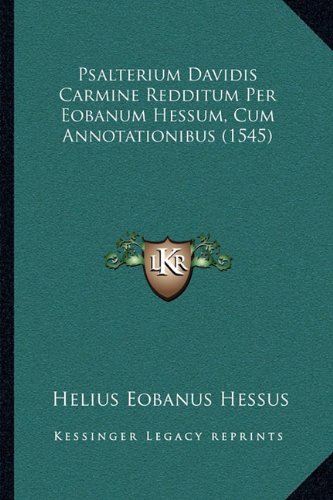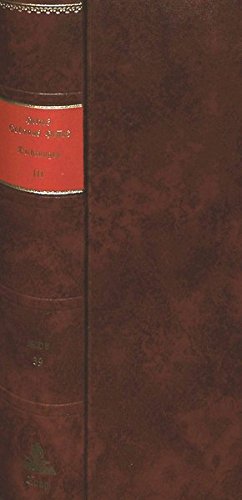Background
Hessus was born on January 6, 1488 in Haina, Germany. His family name is said to have been Koch; Eoban was the name of a local saint; Hessus indicates the land of his birth, Helius the fact that he was born on Sunday.



(This scarce antiquarian book is a facsimile reprint of th...)
This scarce antiquarian book is a facsimile reprint of the original. Due to its age, it may contain imperfections such as marks, notations, marginalia and flawed pages. Because we believe this work is culturally important, we have made it available as part of our commitment for protecting, preserving, and promoting the world's literature in affordable, high quality, modern editions that are true to the original work.
http://www.amazon.com/gp/product/1166201449/?tag=2022091-20

(Helius Eobanus Hessus (1488-1540) - der «König» des Erfur...)
Helius Eobanus Hessus (1488-1540) - der «König» des Erfurter Dichterkreises - ist der bedeutendste Vertreter des christlichen Humanismus in Deutschland. Mit seinem «Bucolicon» (1509) führte er die zyklische Ekloge in die deutsche Literatur ein und mit den viel bewunderten «Heroidum Christianarum Epistolae» (1514) begründete er die Gattung des christlichen heroischen Briefes. Sein vielseitiges, aber auch stilistisch hervorragendes Oeuvre umfaßt Zeitgedichte (z.B. über die Reformation und den Bauernkrieg), Trauergedichte auf berühmte Zeitgenossen (Friedrich der Weise, Albrecht Dürer, Ulrich von Hutten u.a.m.) sowie beachtenswerte Gelegenheitsgedichte («Sylvarum libri IX»). Besonders berühmt wurde sein Lobgedicht auf Nürnberg («Urbs Noriberga illustrata»). Auch als Übersetzer aus dem Griechischen hat sich Eobanus einen hervorragenden Namen gemacht (erste metrische Übersetzung aller Idyllen Theokrits und der ganzen «Ilias»). Die Dichtungen werden hier zum großen Teil erstmals kritisch ediert und übersetzt.
http://www.amazon.com/gp/product/3261039337/?tag=2022091-20

(Excerpt from Noriberga Illustrata und Andere Städtegedich...)
Excerpt from Noriberga Illustrata und Andere Städtegedichte Tage treten, sondern nur dem nachgebildet sind, was von alten Autoren wie Pindar, Ennius, Horaz, Ovid u. A. Dariiber gesagt worden war. About the Publisher Forgotten Books publishes hundreds of thousands of rare and classic books. Find more at www.forgottenbooks.com This book is a reproduction of an important historical work. Forgotten Books uses state-of-the-art technology to digitally reconstruct the work, preserving the original format whilst repairing imperfections present in the aged copy. In rare cases, an imperfection in the original, such as a blemish or missing page, may be replicated in our edition. We do, however, repair the vast majority of imperfections successfully; any imperfections that remain are intentionally left to preserve the state of such historical works.
http://www.amazon.com/gp/product/0282071288/?tag=2022091-20
Hessus was born on January 6, 1488 in Haina, Germany. His family name is said to have been Koch; Eoban was the name of a local saint; Hessus indicates the land of his birth, Helius the fact that he was born on Sunday.
Hessus visited a Latin school in Frankenberg, Hesse. In 1504 he entered the university of Erfurt.
Soon after his graduation, Hessus was appointed rector of the school of St Severus. This post he soon lost, and spent the years 1509-1513 at the court of the bishop of Riesenburg. Returning to Erfurt, he was reduced to great straits by his drunken and irregular habits. At length (in 1517) he was appointed professor of Latin in the university. He was prominently associated with the distinguished men of the time (Johann Reuchlin, Konrad Peutinger, Ulrich von Hutten, Konrad Mutianus), and took part in the political, religious and literary quarrels of the period, finally declaring in favor of Luther and the Reformation for the rest of his life. The university was seriously weakened by the growing popularity of the new University of Wittenberg, and Hessus endeavoured (but without success) to gain a living by the practice of medicine. Through the influence of Camerarius and Melanchthon, he obtained a post at Nuremberg (1526), but, finding a regular life distasteful, he again went back to Erfurt (1533). But it was not the Erfurt he had known; his old friends were dead or had left the place; the university was deserted. A lengthy poem gained him the favor of the Landgrave of Hesse, by whom he was summoned in 1536 as professor of poetry and history to Marburg, where he died. Hessus, who was considered the foremost Latin poet of his age, was a facile verse-maker, but not a true poet. He wrote what be thought was likely to pay or secure him the favor of some important person. He wrote local, historical and military poems, idylls, epigrams and occasional pieces, collected under the title of Sylvae. His most popular works were translations of the Psalms into Latin distichs (which reached over fifty editions) and of the Iliad into hexameters. His most original poem was the Heroides in imitation of Ovid, consisting of letters from holy women, from the Virgin Mary down to Kunigunde, wife of the Emperor Henry II.
(Excerpt from Noriberga Illustrata und Andere Städtegedich...)
(Helius Eobanus Hessus (1488-1540) - der «König» des Erfur...)
(This scarce antiquarian book is a facsimile reprint of th...)
